And yet more Books about Japan
Culture, History, Economy, (Sofa-) Travelling ...
|
Just a small collection ...
|
Culture

German |
Thienemann Japan Pohl, Manfred 1986 ISBN 3522641507 |
One of the German standard volumes about Japan. |
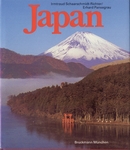
German |
Bruckmann Japan Schaarschmidt-Richter + Pansegrau 1989 ISBN 3765422363 |
One of many books for "couch travellers". |

German |
Bertelsmann Japan 1988 ISBN 372430224X |
One of many books for "couch travellers". This one is a little older ...
... which is just as fascinating, to see what was once and is not more... |


German |
Hoffmann und Campe Japan 1980 / 1992 / ?? |
Merian is one of the most famous German travel book houses :)
The Merian volume about Japan is rewritten every 5 years. It is interesting to compare :) |
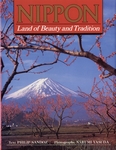
English |
Tuttle Nippon The Land of Beauty and Tradition Sandoz + Yasuda 1992 ISBN 080481855X |
One of many books for "couch travellers".
One of many books for "couch travellers". |

English |
Tuttle The Japanese A Cultural Portrait Ozaki, Robert 1978 ISBN 0804816700 |
11 essays about Japan and the Japanese. |

English Japanese |
Gakuseisha Nippon The Land and Its People 1988 no ISBN |
Bilingual introduction (English/Japanese). The Japanese Text has no furigana. |
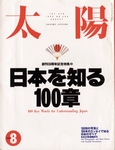
English Japanese |
Taiyou - The Sun 100 Keywords for Understanding Japan 1993 no ISBN |
Bilingual introduction (English/Japanese). The Japanese Text has no furigana. |
History
One of the most fascinating things about Japan, I find, are the striking
"symmetries" between Japans´s and Germany´s histories:
|
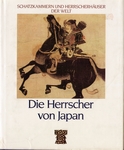
German |
Pawlak Die Herrscher von Japan Wiencek, Henry 1983, 1989 ISBN 3881996222 |
Wie überall auf der Welt waren die ersten "Kulturträger" der Adel am Hofe des Kaisers und der Shogune. Die Hiragana wurden von adligen Lyrikerinnen "erfunden", womit sie ihre Gedichte schrieben. Eine besondere Facette Japaneser Kultur sind die Katana, die Schwerter der Samurai-Kaste. Die Residenzen der Herrscher waren so prachtvoll wie Tempel about Götter. In dieser Umgebung entwickelte sich Theater, Musik usw. |

German |
Nikol Deutschland und Japan im Zweiten Weltkrieg Martin, Bernd 2001 ISBN 3933203503 |
Die bizarre Geschichte der "Achse" und ihre Details zwischen Deutschland und Japan im zweiten Weltkrieg über 8000 km Distanz. |

German |
Eichborn Der Freitod in Japan Pinguet, Maurice 1996 ISBN 3821806370 |
Waren die Kamikazepiloten wahnsinnig, oder fanatisiert oder beides? Wie konnten sie so etwas tun? Die Antwort hat viele Nuancen. Viele waren fanatisiert (das ist die Hauptursache). Aber viele beugten sich einfach dem sozialen Druck der Erwartungen und der "Ehre", für das Land sterben, obwohl sie natürlich alle Angst davor hatten. Wer aber keine Hölle (Fegefeuer, Sünde usw.) kennt und auch sonst das Individuum geringschätzt, hat kaum innere Barrieren. Es ist leicht, ganz normale Menschen "wahnsinnig" zu machen. |

Swedish |
Arena Fjärranära Edström + Svanberg 2001 ISBN 917843162X |
Berättelser om de första kontakter mellan Sverige och Japan. Svenska köpmän och forskare hade kontakt till Japan sedan 1667, men endast genom det holländska Ostindiska kompaniet. |
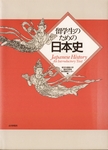
Japanese |
Yamagawa Shuppansha Nihonshi 1990 no ISBN |
"Japanese History" for students learning Japanese. The text has furigana to help reading |
Economy
|
Before the "Bubble Economy" imploded in 1992,
Japan was the major "challenge" to all Western economies.
So in some sence, Japan was once what China is today.
The main point is
asymmetric competition. The buzz word "globalization" was not around then, but it meant the same thing.
One of many famous issues was consumer electronics, that was invented in the West and taken over by Japan...
The reasons for the Japanese crash was the same as for all other bubbles: they had gone too far, lost ground contact and became careless, especially in the finance sector. It is - always - unreal speculations that let an economy implode. |

German |
Knaur The Enigma of Japanese Power Karel van Wolferen 1989 ISBN 3426264390 |
This book came out in many languages, and polarized major parts of the readers,
not because of the facts presented, but of conflicting perceptions on how to judge these facts.
What might be believed as a universal human behavior in successful economics is prooved to be
a false believe, as it functions totally different in Non-Western countries; Japan was
just the first serious example. In the West, particularly the U.S,
governments and companies are percieved "arc enemies". In Japan, they were symbiotic!
This book was written before the Japanese crash. |

German |
Krausskopf Japaner als Geschäftspartner de Mente, Boye 1964 no ISBN |
Was heute in China hochaktuell ist, war damals schon in Japan wichtig:
Andere Länder, andere Sitten, andere Manieren und
andere Empfindlichkeiten - Schlagwort Kulturschock.
|

German |
Kindler Konfuzius und Marktwirtschaft Fukuyama, Francis 1995 ISBN 3463402777 |
Francis Fukuyama polarisiert immer wieder sein Publikum mit seinem "Satellitenblick aus
100 Kilometern Höhe". Aber nur so kann man Strukturen vergleichen (wenn auch nicht unbedingt erklären), die sonst unsichtbar
in einer Kultur zu finden sind. Hier wird der ostasiatische Kunfuzianismus als eine der
Haupttriebfedern für das Streben der Menschen gezeigt. In Ostasien hat der Konfuzianismus
(auch in den gestutzten "Versionen") eine Macht wie eine Religion, die ohne Gott und jegliche Mystik auskommt.
Und er bestimmt alle Lebensbereiche und damit auch die Wirtschaft und Politik eines
Landes.
Helmut Schmidt fragte Deng Xiao Ping bei einem Treffen einmal, ob die chinesische Kommunistische Partei nicht eigentlich eine konfuzianische Partei sei ... Deng grinste und sagte "Ja! Na und?" |

English |
Tuttle Trading Places Prestowitz, Clyde 1988, 1990 ISBN 480530508 |
"Trading Places" is a nice wordplay: it is "market place" as well as
"swapping points". At the peak of economic competition between
the U.S.A. and Japan (1980-90), Japan challenged the US economy like crazy.
This book was written before the Japanese crash. |